This article needs additional citations for verification .(June 2024) |

The Buke of the Howlat, often referred to simply as The Howlat, is a humorous 15th century Scots poem by Richard Holland.
This article needs additional citations for verification .(June 2024) |

The Buke of the Howlat, often referred to simply as The Howlat, is a humorous 15th century Scots poem by Richard Holland.
The poem is a comic allegory in which all the characters are birds with human attributes, with a howlet, or owl, the protagonist. The symbolism is debatable but two of its purposes are clear; it serves as a moral fable warning against vanity and excessive pride, and it is also a piece of propaganda praising the Douglas dynasty of Scots nobles. [1]
Other themes dealt with in the work include satire of the bureaucracy of the medieval church, and the mocking of Highland Scots and their language. [1]
The Howlat is a long, narrative piece full of exuberant comic detail. It is written in rhyming verse heavy with alliteration. [1] The text is preserved in the Asloan and Bannatyne manuscripts. A printed transcript, based mainly on the Asloan text was published by the Bannatyne Club in 1823.
An owl, unhappy with his appearance, decides to appeal to the Pope (a peacock), to be made more handsome. The Pope, assisted by his secretary (a turtledove) and his herald (a swallow) calls a council to discuss the matter. Church dignitaries assemble first, followed by lay representatives led by the Emperor, an eagle.
A long interlude of praise for the Douglas family follows. It includes a retelling of the career of Sir James Douglas.
The narrative resumes with the Pope holding a banquet for his guests. A series of entertainers are presented in vivid comic detail; The mavis leads a band of musicians; the jay performs juggling; the rook, as a highland bard, gives a recitation in mock Gaelic before being driven out by two fools (a peewit and a gowk). The fools then quarrel with each other.
After the feast, the council agrees to meet the owl's request and, after praying to Dame Nature she descends from heaven and arranges a beautiful new plumage for the owl. Each of the assembled birds is required to give up one of his feathers.
Due to his grand new appearance, the owl becomes extremely arrogant and the birds pray again to Dame Nature; this time they request that the owl's gift be revoked. Nature agrees and, deprived of his fine plumage, the owl reflects bitterly on the lesson he has learnt about pride and vanity. [1]
The following stanzas describe some of the entertainment at the birds' feast. They open with the entrance of the bard, who demands food and drink in exchange for his recitation on Irish royal genealogy. He speaks a mixture of mock Gaelic and pidgin Scots. [1]
The bard is heckled by the Rural Dean a raven, but then gives as good as he gets in a Scots which is suddenly very eloquent. The blushing raven retires from the stage.
The Bard is then unceremoniously ejected from the hall by two fools.

In Gaelic myth, the Cailleach is a divine hag and ancestor, associated with the creation of the landscape and with the weather, especially storms and winter. The word literally means 'old woman, hag', and is found with this meaning in modern Irish and Scottish Gaelic, and has been applied to numerous mythological and folkloric figures in Ireland, Scotland, and the Isle of Man. In modern Irish folklore studies, she is sometimes known as The Hag of Beara, while in Scotland she is known as Beira, Queen of Winter.

The Australian magpie is a black and white passerine bird native to Australia and southern New Guinea, and introduced to New Zealand, and the Fijian island of Taveuni. Although once considered to be three separate species, it is now considered to be one, with nine recognised subspecies. A member of the Artamidae, the Australian magpie is placed in its own genus Gymnorhina and is most closely related to the black butcherbird. It is not closely related to the Eurasian magpie, which is a corvid.

The cuckoo, common cuckoo, European cuckoo or Eurasian cuckoo is a member of the cuckoo order of birds, Cuculiformes, which includes the roadrunners, the anis and the coucals.

Colley Cibber was an English actor-manager, playwright and Poet Laureate. His colourful memoir An Apology for the Life of Colley Cibber (1740) describes his life in a personal, anecdotal and even rambling style. He wrote 25 plays for his own company at Drury Lane, half of which were adapted from various sources, which led Robert Lowe and Alexander Pope, among others, to criticise his "miserable mutilation" of "crucified Molière [and] hapless Shakespeare".

In Welsh culture, an eisteddfod is an institution and festival with several ranked competitions, including in poetry and music. The term eisteddfod, which is formed from the Welsh morphemes: eistedd, meaning 'sit', and fod, meaning 'be', means, according to Hywel Teifi Edwards, "sitting-together." Edwards further defines the earliest form of the eisteddfod as a competitive meeting between bards and minstrels, in which the winner was chosen by a noble or royal patron.
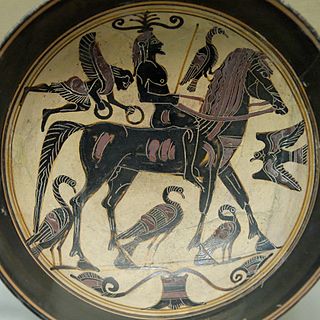
The Birds is a comedy by the Ancient Greek playwright Aristophanes. It was performed in 414 BC at the City Dionysia in Athens where it won second place. It has been acclaimed by modern critics as a perfectly realized fantasy remarkable for its mimicry of birds and for the gaiety of its songs. Unlike the author's other early plays, it includes no direct mention of the Peloponnesian War and there are few references to Athenian politics, and yet it was staged not long after the commencement of the Sicilian Expedition, an ambitious military campaign that greatly increased Athenian commitment to the war effort. In spite of that, the play has many indirect references to Athenian political and social life. It is the longest of Aristophanes's surviving plays and yet it is a fairly conventional example of Old Comedy.

The ruins of Linlithgow Palace are located in the town of Linlithgow, West Lothian, Scotland, 15 miles (24 km) west of Edinburgh. The palace was one of the principal residences of the monarchs of Scotland in the 15th and 16th centuries. Although maintained after Scotland's monarchs left for England in 1603, the palace was little used, and was burned out in 1746. It is now a visitor attraction in the care of Historic Environment Scotland.
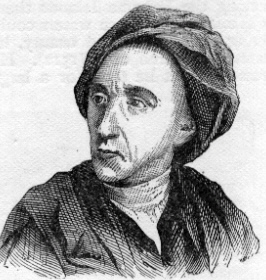
The Dunciad is a landmark, mock-heroic, narrative poem by Alexander Pope published in three different versions at different times from 1728 to 1743. The poem celebrates a goddess, Dulness, and the progress of her chosen agents as they bring decay, imbecility, and tastelessness to the Kingdom of Great Britain.

"The Idiot Boy" is a poem written by William Wordsworth, a representative of the Romantic movement in English literature. The poem was composed in spring 1798 and first published in the same year in Lyrical Ballads, a collection of poems written by Wordsworth and Samuel Taylor Coleridge, which is considered to be a turning point in the history of English literature and the Romantic movement. The poem investigates such themes as language, intellectual disability, maternity, emotionality, organisation of experience and "transgression of the natural."

"The Three Ravens" is an English folk ballad, printed in the songbook Melismata compiled by Thomas Ravenscroft and published in 1611, but the song is possibly older than that. Newer versions were recorded up through the 19th century. Francis James Child recorded several versions in his Child Ballads.
Richard Holland or Richard de Holande was a Scottish cleric and poet, author of the Buke of the Howlat.

Sir William Kirkcaldy of Grange was a Scottish politician and soldier who fought for the Scottish Reformation. He ended his career holding Edinburgh castle on behalf of Mary, Queen of Scots and was hanged at the conclusion of a long siege.

A Satire of the Three Estates, is a satirical morality play in Middle Scots, written by makar Sir David Lyndsay. The complete play was first performed outside in the playing field at Cupar, Fife in June 1552 during the Midsummer holiday, where the action took place under Castle Hill. It was subsequently performed in Edinburgh, also outdoors, in 1554. The full text was first printed in 1602 and extracts were copied into the Bannatyne Manuscript. The Satire is an attack on the Three Estates represented in the Parliament of Scotland – the clergy, lords and burgh representatives, symbolised by the characters Spiritualitie, Temporalitie and Merchant. The clergy come in for the strongest criticism. The work portrays the social tensions present at this pivotal moment in Scottish history.
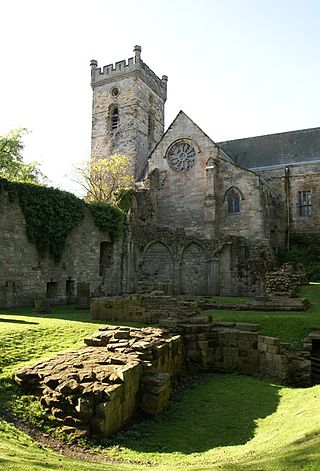
Elizabeth Melville, Lady Culross (c.1578–c.1640) was a Scottish poet.

April Fools' Day or All Fools' Day is an annual custom on 1 April consisting of practical jokes and hoaxes. Jokesters often expose their actions by shouting "April Fools!" at the recipient. Mass media can be involved with these pranks, which may be revealed as such the following day. The custom of setting aside a day for playing harmless pranks upon one's neighbour has been relatively common in the world historically.
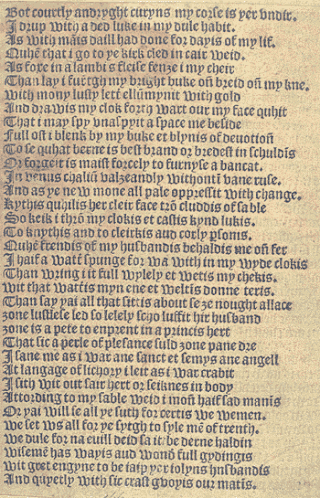
The Tua Mariit Wemen and the Wedo or The Tretis Of The Twa Mariit Wemen and the Wedo is a narrative poem in Scots by the makar William Dunbar.
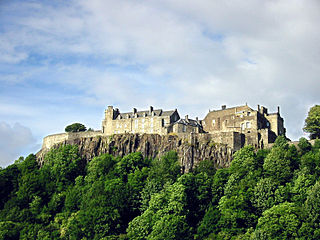
Ane Ballat of the Fenyeit Frier of Tungland, How He Fell in the Myre Fleand to Turkiland is a comic, satirical poem in Scots by William Dunbar composed in the early sixteenth century. The title may be rendered in modern English as A Ballad of The False Friar of Tongland, How He Fell in the Mire Flying to Turkey.

The Dregy Of Dunbar also known as Dumbaris Dirige to the King is a humorous poem in Scots and Latin composed by William Dunbar. at an unknown date.

The Thrissil and the Rois is a Scots poem composed by William Dunbar to mark the wedding, in August 1503, of King James IV of Scotland to Princess Margaret Tudor of England.